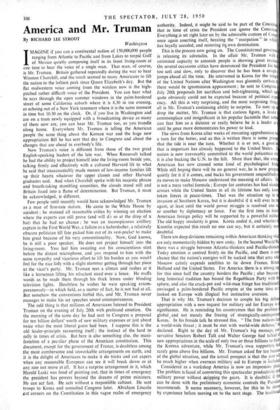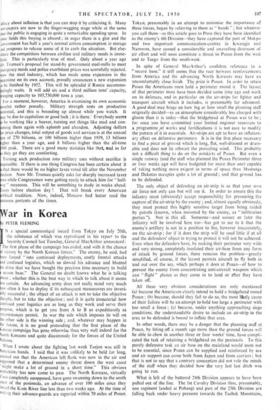America and Mr. Truman By RICHARD LEE STROUT
Washington
IMAGINE if you can a continental nation of 150,000,000 people ranging from Atlantic to Pacific and from Lakes to torpid Gulf of Mexico quietly composing itself in its front living-room at one time to hear the voice of a single man. That man, of course, is Mr. Truman. Britain gathered repeatedly during the war to hear
Winston Churchill, and the result seemed to many Americans to lift the nation to the loftiest peak since Queen Elizabeth's day. But the flat midwestern voice coming from the wireless now is the high- pitched rather difficult voice of the President. You can hear what he says through the open summer windows in the palm-bordered street of some California suburb where it is 8.30 in tne evening, or echoing out of a New York tenement where it is the same moment in time but 10.30 on the clock. Or, if you live in Washington and are on a tram newly equipped with a broadcasting device as many of them now are, you can hear Mr. Truman too, as you trundle along home. Everywhere Mr. Truman is telling the American people the same thing about the Korean war and the huge new appropriation Bill he has sent that day to Congress and about the changes that are ahead in everbody's life.
Now Truman's voice is different from those of the two great English-speaking leaders of the late war. When Roosevelt talked he had the ability to project himself into the living-room beside you, talking firmly and effectively with a cultured Harvard lilt to what he said that unaccountably made masses of low-income families lift up their hearts whatever the upper classes and other Harvard graduates said. And when Churchill spoke with his majestic phrase and breath-taking stumbling sonorities, the clouds stood still and Britain fused into a flame of determination. But Truman, it must be acknowledged, is different.
Few people until recently would have acknowledged Mr. Truman as a man of first-rate stature. He came to the White House by accident ; he stunned all reasonable critics by winning an election where the experts can still prove (and will do so at the drop of a hat) that he had no chance ; he was an inconspicuous artillery captain in the First World War, a failure as a haberdasher, a relatively obscure politician till fate picked him out of its vest-pocket to make him great because of his very conventionality. Now, God knows, he is still a poor speaker. He does not project himself into the living-room. You feel him sweating out his conscientious stint before the distant microphone, and you respond to him with the same sympathy and vicarious effort to lift his burden as you would feel for the nice lady with a slight stammer getting through her piece at the vicar's party. Mr. Truman sees a climax and rushes at it like a horseman lifting his reluctant steed over a fence. He muffs words as he reads them through his thick lenses under blinding television lights. Doubtless he wishes he were speaking extem- poraneously—in which field, as a matter of fact, he is not bad at all. But somehow the conventions forbid this, and Mr. Truman never manages to make his set speeches sound extemporaneous.
The odd thing is that millions of Americans listened to President Truman on the evening of July. 20th with profound emotion. On the morning of the same day he had sent to Congress a proposal for ten billion dollars' worth of new military expenses or just about twice what the most liberal guess had been. I suppose this is the old leader-principle reasserting itself ; the instinct of the herd to rally in times of crisis. But here is also something else, the mani- festation of a peculiar phase of the American constitution. This document, except for the government of France, is doubtless among the most cumbersome and unworkable arrangements on earth, and it is the delight of Americans to make it do tricks and cut capers when any reasonable European can see it will break down or at any rate not move at all. It has a surprise arrangement in it, which Harold Laski was fond of pointing out, that- in times of emergency the president has powers beyond the dreams of prime ministers. He can act fast. He acts without a responiible cabinet. He sent troops to Korea and consulted Congress later. Abraham Lincoln put corners on the Constitution in this vague realm of emergency
authority. Indeed, it might be said to be part of the Constit that in time of crisis the President can ignore the Constitu Everything is set right later on by the admirable custom of Con once again asserting itself, berating the " usurpation " in which has loyally acceded, and restoring its own domination. This is the process now going on. The Constitutional govern is releasing its adrenalin. In the affair Mr. Truman with unlimited capacity to astonish people is showing great resilie,, On several occasions critics have denounced the President for be too soft and slow, only to discover that he has been a couple jumps ahead all the time. He intervened in Korea for the inter of the United Nations after Washington was gloomily certain there would be ignominious appeasement ; he sent to Congress July 20th proposals for sacrifices and belt-tightening, which a quite obviously could not be expected because of political eNp, ency. All this is very surprising, and the most surprising thing all is Mr. Truman's continuing ability to surprise. To sum up drop the matter, Mr. Truman is that curious figure, a leada commonplace and insignificant in his popular facsimile that nob, can fear him as a dictator or really believe he is a leader at until hence more demonstrates his power to lead.
The news from Korea after weeks of mounting apprehension It a turn for the better, and as this is written there is some pros that the tide is near the turn. Whether it is or not, a good d that is important has already happened to the United States. L nation is now irrevocably committed to the world policeman ro it is also backing the U.N. to the hilt. More than that, the aver American has now crossed some kind of psychological brill, While still hoping there will be no general war, he is now pre quietly for it if it comes, and backs his government unqualifiedh its moves to make Moscow understand the meaning of affairs. is not a mere verbal formula ; Europe for centuries has had stand armies while the United States in all its lifetime has only know token forces in peace-times. That was the situation up to invasion of Southern Korea, but it is doubtful if it will ever be again, at least until the world power struggle is resolved one w. or another by diplomacy or force. For the first time in histo American foreign policy will be supported by a poweiful The old happy insularity is gone. Korea ended it, and whether Kremlin expected this result no one can say, but it certainly see doubtful.
There are deep divisions remaining within American thinking wh are only momentarily hidden by new unity. In the Second World W there was a struggle between Atlantic-thinkers and Pacific-thinke Today emotion is centred firmly.dn the Pacific, and there is so, chance that the nation's energies will be sucked into that area wb Moscow calmly expends satellites to tie down France, Brita Holland and the United States. For America there is a strong u for this since half the country borders the Pacific ; also because long historical tradition has bound the Republican Party with t sphere, and also the crack-pot and wild-man fringe has traditional envisaged a palm-bordered Pacific empire at the same time as looked on Europe with illogical but instinctive aversion.
That is why Mr. Truman's decision to couple his big defen appropriation with a new request for military aid for Europe is significance. He is reminding his countrymen that the problem global and not merely the freeing of strategically-unimporta Korea. , In his fireside talk he stressed this. " The free nations fa a world-wide threat ; it must be met with world-wide defence," declared. Right to the day of Mr. Truman's big message, co servative Senators Robert Taft and Walter George had talked new appropriations in the scale of only two or three billions to finis the Korean adventure, while Mr. Truman's own supporters hag rarely gone above five billions. Mr. Truman asked for ten because of the global situation, and the actual prospect is that the sum be much higher when overseas military aid to Europe is includ Considered as a workshop America is now an impressive pia The problem is faced of converting this spectacular productivity in military power without stripping the gears. It is doubtful if di can be done with the preliminary economic controls the Preside recommends. It seems necessary, however, for this to be shoo by experience before moving on to the next stage. The traditional 'lacy about inflation is that you can stop it by criticising it. Many wspapers are now in the finger-wagging stage while at the same me the public is engaging in quite a remarkable spending spree. In me fields this buying is absurd ; in sugar there is a glut and the overnment has half a year's normal cotton consumption in storage nd proposes to release some of it to curb the situation. But else- here the competition between civilian and military needs is imme- iate. This is particularly true of steel. Only about a year ago r. Truman's proposal for stand-by government steel-mills to meet iergency needs and police exorbitant prices was scornfully rejected. ow the steel industry, which has made some expansion in the eantime on its own account, proudly announces a new expansion be finished by 1952. This will be splendid if Russia accommo- tingly waits. It will add six and a third million tons' capacity, ringing capacity to 105,750,000 tons a year.
For a moment, however, America is examining its own economic uscles rather proudly. Military strength rests on productive tential, and this is bounding up almost while you watch. It ay be due to capitalism or good luck ; it is there.' Everybody seems be working like a beaver, turning out things like mad and con- ming them again with aplomb and abandon. Adjusting dollars
r price changes, total output of goods and services is at the annual to of 270 billions, or 100 billions higher than 1939, 13 billions igher than a year ago, and 8 billions higher than the all-time 48 peak. There are a good many statistics like that, and as far s they go they are comforting.
Turning such production into military uses without sacrifice is possible. If there is one thing Congress has been certain about it that there would be no higher taxes voted till after the November lection. Now Mr. Truman quietly asks for sharply increased taxes yen while Congressmen were getting ready to attack him for " half- ay " measures. This will be something to study in weeks ahead. axes before election day ! That will break every American litical tradition. Now, indeed, Moscow had better read the minous portents of the times.



































 Previous page
Previous page